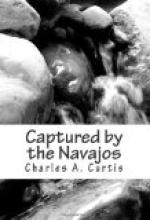“Usted capitan?” (Are you the captain?)
I replied in the affirmative.
“Yo capitan, tambien; mucho grande heap capitan.” (I’m a captain, too; a very great heap captain.)
He then asked where we were from and where we were going, and informed us that they were Yavapais on a hunting expedition. We exchanged hard bread with them for a few cottontails, and set Clary to making a rabbit-stew, the boys and I deferring our supper until it should be ready.
“Oh, Mr. Duncan,” shouted Henry from the direction of the Indians, a few moments later, “come and see what these creatures are doing!”
I left the ambulance and joined the group of soldiers who stood in a circle about an inner circle of seated Indians. Each Yavapai had selected a rat from the collection in his belt, and had laid it on the coals without dressing it or in any way disturbing its anatomy. He rolled the rat over once or twice, and took it up and brushed and blew off the singed hair. He placed it again on the coals for a moment, and, taking it up, pinched off the charred fore legs close to the body and the hind legs at the ham-joint. Replacing it on the fire, he turned it over a few more times. Picking it up for the third time, he held it daintily in the palm of his left hand, and with the fingers of his right plucked off the flesh and put it in his mouth.
When we were making our beds ready for the night, Vic, whom we had forgotten in the exciting events of the evening, trotted into camp and laid a horseshoe in Henry’s lap. The lad took it up, and exclaimed:
“One of Chiquita’s shoes!—a left hind shoe!”
“How do you know?” I asked.
“Private Sattler always shaped the heel of the left shoe like this, to correct a fault in her gait.”
“May I look at the shoe, sergeant?” asked Corporal Duffey, approaching from the group of men near the guard’s fire. “Shoes are like hand-writing—no two blacksmiths make them alike. I am a blacksmith by trade, and know all the shoes made by the smiths of our regiment. This,” examining it, “is one of Sattler’s. He put a side-weight on it, and here is the bevel-mark of his hammer.”
“Then our ponies have certainly passed here, and Vic was on their trail when we saw her coming from the Tanks,” remarked Frank; “but there could have been no scent after so long a time.”
“Oh, she knows Sancho’s and Chiquita’s tracks,” asseverated Henry; “she knows their halters, bridles, and will bring them when told to, without mistake.”
The sentinel awakened us next morning at four o’clock, and informed us that the Indians had left two hours before. The animals were again driven to the Tanks, the vessels and canteens filled, and at six o’clock we were on the road. Nearly all our water was used in the preparation of breakfast, except that in the canteens. It would have been better if we had made a third trip to the cisterns and refilled our coffee-pot and camp-kettles; but the delay necessary to do it, and the assurance that there was water at Hole-in-the-Plain, determined me to go on at once. The weather was a repetition of that of the previous day—hot and windless.




